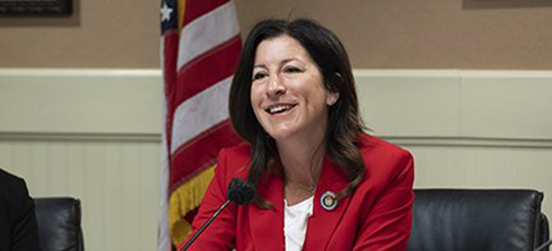Assemblymember Cottie Petrie-Norris freely admits it was the election of Donald J. Trump in 2016 that first led her to consider a career in an elected office.
“It was a wake-up call for a lot of us, ” she said.
In fact, there was a clarion call for women to get involved and become candidates. “We wanted a seat at the table,” is how Assemblymember Petrie-Norris described it.
Living in Laguna Beach with her husband, Colin, and their two sons, Dylan and Hayden, Petrie-Norris threw her hat in the ring and ran for California’s 74th Assembly District, which includes Costa Mesa, Laguna Beach, Laguna Woods, Newport Beach and parts of Irvine and Huntington Beach. She ran against a Republican incumbent and was among the wave of Orange County Democrats who won office that year turning Orange County “blue” for the first time in decades. Petrie-Norris won re-election in 2020 and has announced that she is running again this year.
The assemblymember admits that prior to 2016 she had not considered a career that would include being in the California Legislature. But looking back on her life, she realizes it is full of taking on new challenges, which prepared her well for her current life in politics.
She was born and raised in California, growing up in a working-class family in San Diego. Her mother was a homemaker, who took on various jobs to help with the family finances, while her stepdad was a union machinist.
Petrie-Norris went through the California public school system where she notes “she received a very good education” that opened the world to her. The first opportunity was the chance to go to Yale University, where she majored in Economics and English. After college, she went into banking and spent about two decades in the finance and technology sectors with stops in Washington D.C., South Africa and London. She worked for Fortune 500 corporations, small companies and start-ups. About a decade ago, she and her family came back to California, settling in Laguna Beach.
In the California Legislature, Petrie-Norris does see herself as rather unique as she is one of very few Democrats that come from a business background. In fact, she said “very few people in the Legislature know how to run a business and what you have to do to keep the lights on. That’s an important perspective that I bring to the table.”
In fact, in reflecting on her three-plus years in the Assembly, she said the concept of accountability is one area where she believes political leaders can take a lesson from the business community. In business, she said leaders are constantly evaluating their actions. Tracking what you do and determining if your actions resulted in the changes you wanted to implement is an ongoing process. “In the Assembly, we spend a lot of time writing bills and passing laws, but we don’t spend a lot of time looking back.”
She said new laws often have unintended consequences and the mechanism is not there to repeal laws that aren’t doing what they were intended to do, which is a building block of any successful business.
Petrie-Norris also notes that large companies and major industries have an outsized voice in the running of government because they have the time and the staffs to be heard. “The voice of small business is absent in our policymaking,” she said.
Petrie-Norris, in fact, believes that her business background can help be that voice. She sees economic growth as a very vital part of the Legislature’s job. Though the farming community often laments that it has lost much of its clout in the Legislature, Petrie-Norris said agriculture, along with other business sectors such as aerospace and technology, are very important drivers of the California economy and the Legislature knows that. She understands the viewpoint that business often expresses that it is not being heard and its needs are not being met. “That is a universal complaint,” she said, noting that farmers are not alone in believing their message falls on deaf ears. But she assures that is not true.
Petrie-Norris said a recent example is AB 1951, a bill designed to fully exempt manufacturing equipment from the sales and use tax. Currently most states in the country offer a full exemption, while California offers only a partial exemption. Petrie-Norris said that during committee meetings on that bill, agriculture’s viewpoint has been fully vetted with Assembly members vowing to make sure all ag equipment receives the exemption. “Agriculture should know that you have incredible advocates working on your behalf in Sacramento,” she said.
Speaking of Sacramento, this interview was conducted on March 4 just a few days after Assemblymember Petrie-Norris fully opened her office once again. “We are excited to be back,” she exclaimed, speaking of the long coronavirus-mandated shutdown of the state’s government office buildings.
The assemblymember expressed cautious optimism that things can return to at least a new normal. While the state’s political bodies have continued to work, much of the action has been done remotely for most of the past two years. Petrie-Norris admitted that relationship building is an important aspect of political work, and it has been difficult to navigate that aspect remotely. “We have been given the greenlight and we are back open and in person,” she exclaimed on an early March day.

